Loving God’s Family
By Danna Hartline
A pig and a chicken were walking down the street one day when they passed a billboard advertising “America needs a good breakfast.” The picture showed two over-easy eggs and several beautiful strips of bacon.
The chicken said, “Doesn’t that make you proud to see that we contribute daily to better America?”
The pig thought for a moment then said, “That’s easy for you to say. For you it’s just a contribution, but for me it requires my life—a total commitment.”
And so it was with the life and ministry of our Savior, Jesus Christ. His mission was not just to contribute to the world, but to save the world from its sins. He came to this world to give His life for us. Everything He did and taught manifested His divine mission. He taught us what it means to truly love, for He was and is true love.
As we may realize, truly loving one another is not as easy as it may seem at first glance—and it may not be easy to even detect true love at times. But the Savior shows us that commitment to loving mankind is vital. Indeed, He offers us the perfect example of what it means to truly love.
And this is what I want to talk about: true love—because it seems that, as a church, we are struggling with this. We seem to not know how to love each other anymore. Or at least we seem a bit crippled.
I’m troubled because true love is about embracing all of God’s family—every one, every kind. Not every sin but every struggler. It’s having a feeling of camaraderie for each other. It’s a pulling-for, a pulling-together feeling. It’s that Special Olympics kind of love that I witnessed as a youth with my Down syndrome brother, Jonny, and his friends. During every race they grabbed hands and ran to the finish line together, cheering and hugging and high-fiving everyone as awards were announced!
True love is true community. It could also be called family love—a love for all  of God’s family.
of God’s family.
There have been many times in my life when I have felt this family love, where heaven meets earth. I felt it when two friends from a former ward took out their temple endowments. There were six people from the ward who did not make it into that session. We were very sad by that but when we went through the veil, there they were on the other side. I cannot tell you of the feeling that came over me when I saw them waiting for us in the celestial room. I realized that these beautiful people were my family, just as surely as my children and my husband are my family.
Another time I felt family love was when my husband and I moved to Canton, Illinois as a young couple. We moved into a tiny little branch. On the first Sunday, we arrived right at 10:00 and slipped into the last row of benches, which was row three because there only were three pews in this adorable little branch. After the meeting was over, we got up to leave and were astonished upon turning around to find the entire congregation had lined up to welcome us into the branch! They knew absolutely nothing about us; they didn’t know if we were just passing through or if we were going to be lifelong members. All they knew and cared about is that we were there and they were overjoyed!  They treated us like gold from the onset; and you know, when someone treats you like gold, you want to become the gold they already think you are. The reverse is also true, when someone is treated like a problem, we should not be surprised when that person becomes a problem.
They treated us like gold from the onset; and you know, when someone treats you like gold, you want to become the gold they already think you are. The reverse is also true, when someone is treated like a problem, we should not be surprised when that person becomes a problem.
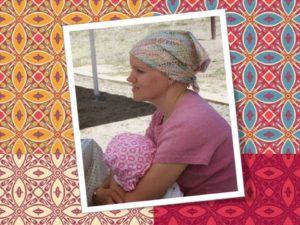 Another time I felt true family love was when my sister, Katie, died. On the day that she died, I was just sitting on Katie’s couch, feeling the magnitude of the loss. Seeing me, my other sister, Darcee, came over and sat down next to me, put her arm around me and her head on my shoulder and said, “Danna, I know I’m not Katie, but I still love you.” Heaven definitely met earth at that moment. I felt a multitude of love and emotion for my dear, dear sisters.
Another time I felt true family love was when my sister, Katie, died. On the day that she died, I was just sitting on Katie’s couch, feeling the magnitude of the loss. Seeing me, my other sister, Darcee, came over and sat down next to me, put her arm around me and her head on my shoulder and said, “Danna, I know I’m not Katie, but I still love you.” Heaven definitely met earth at that moment. I felt a multitude of love and emotion for my dear, dear sisters.
I have felt this kind of family love among people all over the earth. I have felt it 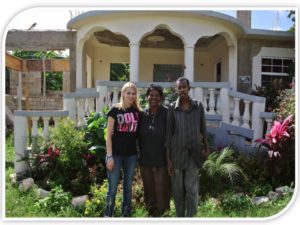 with complete strangers. I felt it when my husband and I were in Jamaica—on our first trip and on our returning trips. As I visited their homes and mingled with them on the streets, I knew they were my family. I have felt that love in every country I have visited.
with complete strangers. I felt it when my husband and I were in Jamaica—on our first trip and on our returning trips. As I visited their homes and mingled with them on the streets, I knew they were my family. I have felt that love in every country I have visited.
In the Bible, there is a beautiful story of David and Jonathan. If there was ever a person who had reason to feel animosity and jealousy for another it was Jonathan against David. By birthright, Jonathan should have been the next king. King Saul was his father but David had been appointed to be the next king by Samuel. Further, Jonathan’s father hated David and sought his life. But Jonathan saw something godly in David and put his own life on the line to protect him from his own father. Speaking of Jonathan’s love for David, 1 Samuel 18:1 says,  “The soul of Jonathan was knit with the soul of David, and Jonathan loved him as his own soul.” David’s love for Jonathan was equal to that of Jonathan’s. When he found out about Jonathan’s death, David felt his heart would break. He said, “I am distressed for thee, my brother Jonathan: very pleasant hast thou been unto me: thy love to me was wonderful” (2 Samuel 1:26).
“The soul of Jonathan was knit with the soul of David, and Jonathan loved him as his own soul.” David’s love for Jonathan was equal to that of Jonathan’s. When he found out about Jonathan’s death, David felt his heart would break. He said, “I am distressed for thee, my brother Jonathan: very pleasant hast thou been unto me: thy love to me was wonderful” (2 Samuel 1:26).
We may be tempted to think that family love, or true community, should be simple to obtain, but on the contrary, it is not always easy to come by. It is not the same as faking it. It is not pseudo-community in which everyone puts on their Sunday smiles and pretends everything is fine if it’s not. Everyone doesn’t always agree all the time. A case in point is when President Eyring first observed of the Quorum of the Twelve Apostles. He said he expected it to be a very calm, serene meeting but he was astonished by what he saw. He said there were strong, opposing views coming at each other and no one was holding anything back. He said it was almost a contentious environment, for so strong were the feelings and ideas. He said he was watching it with his 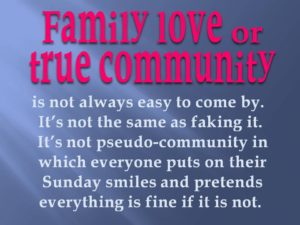 Harvard eyes, thinking, “Wow. This doesn’t happen in the business world. In the business world, the boss is always right. You don’t question the boss.” But he said, “It took a great deal of time, effort, and desire, but eventually the men came together and the feeling of peace was astounding.” He concluded, in essence, “That would not have happened if all the feelings and ideas were not able to be freely expressed, if they would have been suppressed” (Press Conference after being sustained to the First Presidency, October 6, 2007).
Harvard eyes, thinking, “Wow. This doesn’t happen in the business world. In the business world, the boss is always right. You don’t question the boss.” But he said, “It took a great deal of time, effort, and desire, but eventually the men came together and the feeling of peace was astounding.” He concluded, in essence, “That would not have happened if all the feelings and ideas were not able to be freely expressed, if they would have been suppressed” (Press Conference after being sustained to the First Presidency, October 6, 2007).
We learn some interesting elements of what true community means from this story. True family love doesn’t attack people, it contends with ideas. When ideas and differences of opinions are not addressed and respected,  undercurrents and resentments form and there becomes an attack on people which creates a lack of respect and safety. With true communities there is safety and respect.
undercurrents and resentments form and there becomes an attack on people which creates a lack of respect and safety. With true communities there is safety and respect.
On the studies I have done on true communities, I’ve discovered that in atmospheres of safety and respect, healing and converting effortlessly begins to occur without anyone pushing it. It happens because people want to change themselves. People are free to be vulnerable without fear of being taken advantage of or mocked. In such atmospheres, people want to help; they want to be the best they can be, to contribute and correct themselves. In such settings, the scripture in James 5:16 is safe to become a reality: “Confess your faults one to another and pray for one another that ye may be healed.” There is an open correspondence, as it talks about in the Book of Mormon which happened between the Anti-Nephi-Lehies and the Nephites. Alma 23:18 says, “And [the Anti-Nephi-Lehies] began to be a very industrious people; yea, and they were friendly with the Nephites; therefore, they did open a correspondence with them, and the curse of God did no more follow them.” Then Alma 24: 9 says, “[We] thank [our] God, that by opening this correspondence we have been convinced of our sins.” Change happens when we are safe and respected.
Another element of true community is that it faces the hard issues. An example of this is found in the life of the Savior when a woman is caught in adultery and brought before Him (John 8). It seems at first as if the Savior is avoiding the issue because He stoops down to the ground. I’ve pondered,  “Why did He do that? Why did he bend down and not face the accusers right away?” The scriptures leave that explanation void but we do know that the Lord did nothing according to His own will. It seems to me as if for a moment the Savior is symbolically pushing the pause button, perhaps to receive the errand from the Lord. Whatever the reason, when He stood, He faced the issue straight on: “He who is without sin among you, let him be the first to cast a stone at her” (verse 7). Throughout His life, He did not avoid but faced the issues before Him. He was continually groaning within Himself and asking the people, “How much longer am I going to be with you?” because they lacked faith and footing in true discipleship. From His example, we learn that true family love is not avoidance. True love repents and forgives. Issues are not hidden or thrown under the rug.
“Why did He do that? Why did he bend down and not face the accusers right away?” The scriptures leave that explanation void but we do know that the Lord did nothing according to His own will. It seems to me as if for a moment the Savior is symbolically pushing the pause button, perhaps to receive the errand from the Lord. Whatever the reason, when He stood, He faced the issue straight on: “He who is without sin among you, let him be the first to cast a stone at her” (verse 7). Throughout His life, He did not avoid but faced the issues before Him. He was continually groaning within Himself and asking the people, “How much longer am I going to be with you?” because they lacked faith and footing in true discipleship. From His example, we learn that true family love is not avoidance. True love repents and forgives. Issues are not hidden or thrown under the rug.
In the book, Almost Christian, it says, “the fruit … of Christian faith is holiness, not [mere] niceness.” Let’s talk about what that means for a minute: so the fruit that comes from being a true Christian is not that we will necessarily become nicer but that we will become holier. The temples would attest to that, would they not? They say “Holiness to the Lord.” Can you imagine the mockery that would be insinuated if they said, “Niceness to the Lord”? There is a difference between being nice and being holy. So back to the quote: “The fruit … of Christian faith is holiness, not [mere] niceness, which is not a course for the faint of heart. If the Bible is any indication, holy people make us uncomfortable. They take sacrificial risks on behalf of others; they are disarmingly wise and, often, disconcertingly weird. They expose us with their honesty. … Yet in their faith is the passion of God, who empowers them for mission and calls them out of their comfort zones so they can call us out of ours…. [Mere niceness,] or “benign whateverism,” is NOT Christianity….’Benign whatever-ism’ is a far cry from holiness….The love God shows…is passion, a love worthy of suffering.”
True community or family love thus means shared suffering. An example again from the Savior’s life is when Lazarus died. Mary and Martha were so distraught. Tears streamed down their faces. Seeing the sadness of these women, the shortest verse in scripture is presented to us, “Jesus wept” (John 11:35). He wept even though He knew within minutes everything was going to be fine again—that Lazarus was going to be raised from the dead, that all the tears would be dried and replaced with joy. But He felt their pain at that moment as if it were His own. And when the Jews saw this, they exclaimed,  “Behold, how he loved [them]!” (verse 36). He suffers when we suffer. That is true family love–it’s working through the trials and suffering together because they belong to all of us. We hold onto each other because we believe in the process of becoming; we believe we will get there quicker as we support, accept, and help one another.
“Behold, how he loved [them]!” (verse 36). He suffers when we suffer. That is true family love–it’s working through the trials and suffering together because they belong to all of us. We hold onto each other because we believe in the process of becoming; we believe we will get there quicker as we support, accept, and help one another.
Next, true family love serves and accepts our smallest offerings with grace and gratitude. Indeed, Jesus knew how to pull the best out of people. He accepted a small boy’s contribution of five loaves and two little fishes. He accepted the widow’s meager offering. He took notice of the woman who touched His robe. He invited Saul, the persecutor, to join His ministry. In true communities, “all God’s creatures got a place in the choir.” No one is 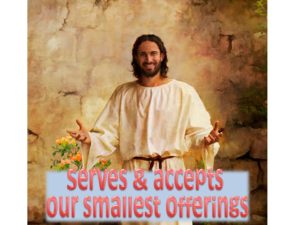 overlooked or overused. Members are happily doing their part without fear of rejection or ridicule because they are safe and respected. Their roles are also permeable. Everyone—everyone of us—has much to give, much to offer. And from the Savior’s example, true leaders learn how to truly motivate the best in people. Consequently, members feel valued and want to contribute. Jesus taught us that where true love exists, everyone is invited to help and sacrifice and appreciate and share—and they are safe to freely do so.
overlooked or overused. Members are happily doing their part without fear of rejection or ridicule because they are safe and respected. Their roles are also permeable. Everyone—everyone of us—has much to give, much to offer. And from the Savior’s example, true leaders learn how to truly motivate the best in people. Consequently, members feel valued and want to contribute. Jesus taught us that where true love exists, everyone is invited to help and sacrifice and appreciate and share—and they are safe to freely do so.
Finally, one more example of the kind of love the Lord has for us. In Revelation 21:4, it says, “And God shall wipe away all tears from their eyes.” I don’t know about you, but I’m a Kleenex-hander—not a tear-wiper—unless there is complete safety and respect, unless I have faced the hard issues with them,  unless I have shared in their suffering, unless I have served them. That is the kind of love the Savior has for us: “And God shall wipe away all tears from their eyes; and there shall be no more death, neither sorrow, nor crying, neither shall there be any more pain: for the former things are passed away.” There is nothing pseudo about the Savior’s love for us. He is pure. He is holy. He is fully and completely committed to us. May we strive to be totally committed to Him—as He is to us. He will help us as we strive to truly manifest family love for one another. Our homes need it; our church needs it; our world needs it.
unless I have shared in their suffering, unless I have served them. That is the kind of love the Savior has for us: “And God shall wipe away all tears from their eyes; and there shall be no more death, neither sorrow, nor crying, neither shall there be any more pain: for the former things are passed away.” There is nothing pseudo about the Savior’s love for us. He is pure. He is holy. He is fully and completely committed to us. May we strive to be totally committed to Him—as He is to us. He will help us as we strive to truly manifest family love for one another. Our homes need it; our church needs it; our world needs it.
 **Danna is the creator of The Mormon Trauma Mama. She is actively involved in advocating for those suffering from church trauma and is currently getting her Master’s degree in Pastoral Counseling from California Southern University. She and her husband have four delightful children.
**Danna is the creator of The Mormon Trauma Mama. She is actively involved in advocating for those suffering from church trauma and is currently getting her Master’s degree in Pastoral Counseling from California Southern University. She and her husband have four delightful children.
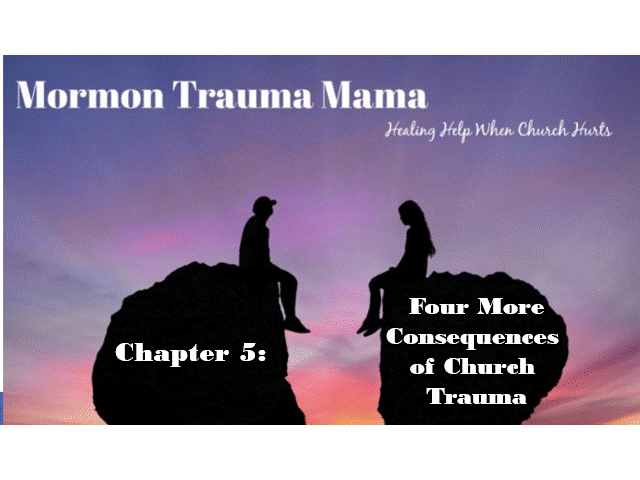

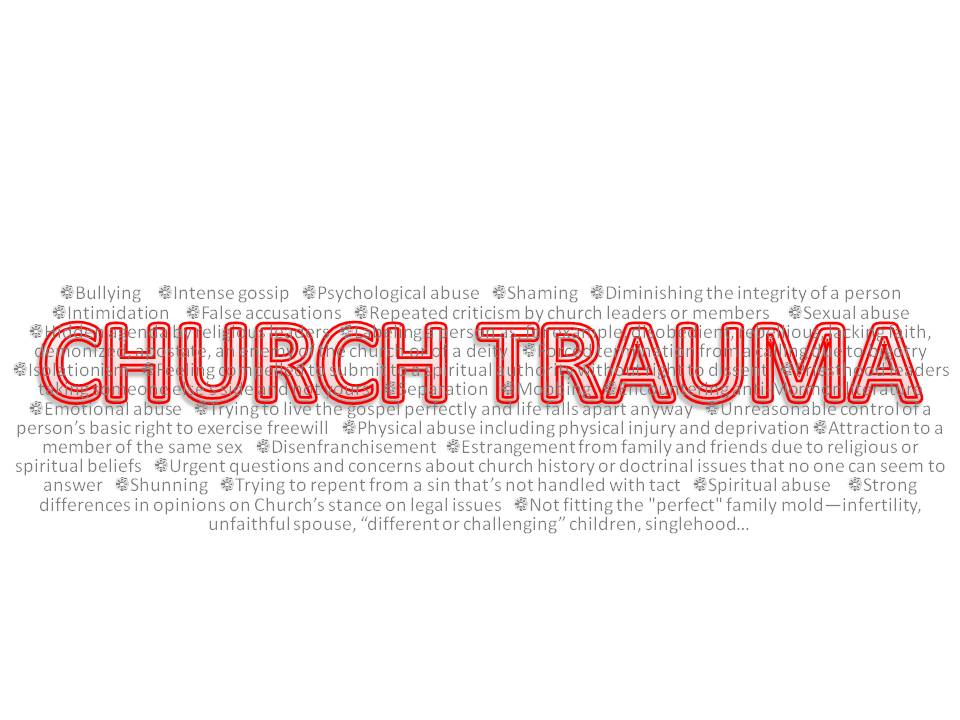

2 Comments
B. Burley
This is beautifully written, Danna! How much wisdom you have exemplified here!
Kallie M.
Oh my goodness Danna, this post is beautiful!!! Spoken with such grace and wisdom. I am grateful for the gift you have and that you are using it to share insights that will bring us closer to living a Christlike life.